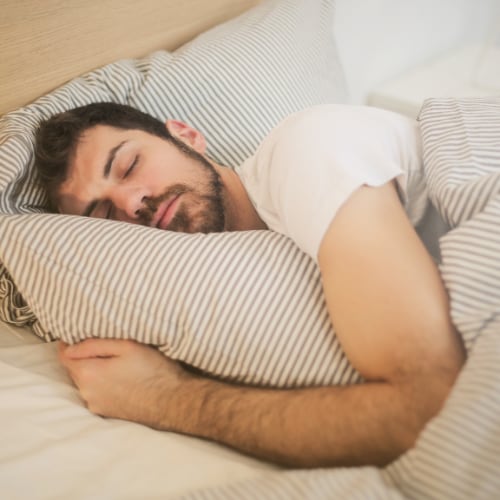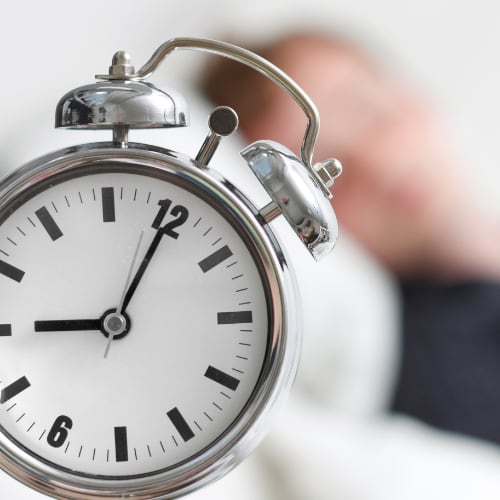 Understanding Sleep: A Detailed Examination
Understanding Sleep: A Detailed Examination
Understanding Sleep: A Detailed Examination

-
Main Ideas
Learning Objective
Understand the factors disrupting natural sleep patterns and learn strategies to improve sleep hygiene and dietary choices for better rest.
Behavioral Objective
Implement one sleep hygiene improvement, such as managing light exposure or adjusting diet, to support restful sleep and overall health.
Key Thought
Quality sleep is a foundation for well-being, and understanding its intricacies can help you align modern habits with natural rhythms.
-
Main Ideas
Learning Objective
Understand the factors disrupting natural sleep patterns and learn strategies to improve sleep hygiene and dietary choices for better rest.
Behavioral Objective
Implement one sleep hygiene improvement, such as managing light exposure or adjusting diet, to support restful sleep and overall health.
Key Thought
Quality sleep is a foundation for well-being, and understanding its intricacies can help you align modern habits with natural rhythms.
-
Terms
- Circadian Rhythms
noun
The body's natural internal clock that regulates sleep and wake cycles, influenced by light and darkness.
- Melatonin
noun
A hormone produced by the pineal gland that regulates sleep-wake cycles and promotes restful sleep.
- Nutritional Deficiency
noun
A lack of essential nutrients in the diet that impairs bodily functions, including sleep quality.
- Sleep Hygiene
noun
Practices and habits that create an optimal environment for restful sleep, including managing light exposure and improving diet.
-
Terms
- Circadian Rhythms
noun
The body's natural internal clock that regulates sleep and wake cycles, influenced by light and darkness.
- Melatonin
noun
A hormone produced by the pineal gland that regulates sleep-wake cycles and promotes restful sleep.
- Nutritional Deficiency
noun
A lack of essential nutrients in the diet that impairs bodily functions, including sleep quality.
- Sleep Hygiene
noun
Practices and habits that create an optimal environment for restful sleep, including managing light exposure and improving diet.
Introduction
Sleep is a fundamental aspect of human health, intricately linked to our daily routines and natural environment. Historically, sleep patterns were shaped by cycles of daylight and darkness, promoting alignment with nature. However, modern lifestyle changes have disrupted these natural rhythms, leading to widespread sleep issues. This examination delves into how artificial light, sedentary behaviors, and dietary changes affect sleep and offers actionable solutions to enhance sleep quality.
Disruption of Natural Sleep Patterns
Artificial Light
Since the invention of artificial lighting, including bulbs and electronic screens, human exposure to natural light has decreased dramatically. This constant availability of light interrupts circadian rhythms, the internal body clocks that regulate sleep and wake cycles. Disrupted circadian rhythms often result in poor sleep quality and difficulty falling or staying asleep.
Sedentary Lifestyles
Modern lifestyles often involve long hours of inactivity due to desk jobs and minimal physical activity. Historically, physical exertion prepared the body for restful sleep, but the lack of such activity in contemporary routines contributes to an increasing prevalence of sleep disorders. Regular movement is essential for natural fatigue and better sleep onset.
Changes in Diet
The shift from fresh, local foods to processed, nutrient-deficient meals has far-reaching impacts on overall health, including sleep. The body's nightly regenerative processes require nutrients to function optimally, and poor diet choices impair these systems, leading to disrupted sleep patterns.
The Concept of Sleep Hygiene
Sleep hygiene refers to creating habits and an environment conducive to quality sleep. Strategies for improved sleep hygiene include:
- Managing exposure to artificial light, especially before bedtime.
- Incorporating regular physical activity into daily routines.
- Prioritizing a nutrient-dense, whole-food diet to support bodily functions essential for sleep.
By mirroring aspects of ancestral environments, we can support our body's natural ability to rest and recover, enhancing sleep quality and overall health.
Modern Diet and Its Impact on Sleep
The Complexity of Sleep
Far from being a passive process, sleep engages multiple body systems simultaneously, including the nervous, endocrine, circulatory, musculoskeletal, and immune systems. Sleep quality is intricately tied to how well these systems function, which, in turn, depends on proper nutrition.
Nutritional Deficiencies
Diets rich in processed foods often lack the vitamins and minerals needed for the body to perform its nightly restorative tasks effectively. Nutritional deficiencies can hinder deep, restorative sleep, further compounding sleep issues.
Dietary Recommendations for Improved Sleep
Foods to Avoid
Substances like caffeine and alcohol are common culprits in sleep disruption. Caffeine delays the onset of sleep by blocking sleep-inducing chemicals in the brain, while alcohol interferes with sleep cycles, often causing fragmented and non-restorative rest.
Foods to Embrace
Whole, plant-based foods rich in nutrients and natural compounds like melatonin can promote better sleep. For example:
- Tart Cherries: Naturally high in melatonin, they may help regulate sleep cycles.
- Tomatoes: Contain sleep-supportive compounds and essential nutrients.
- Walnuts: A source of healthy fats and melatonin.
- Kiwi: Known for improving sleep quality due to its serotonin and antioxidant content.
Conclusion
Modern life has significantly disrupted natural sleep patterns through artificial light, inactivity, and dietary changes. However, we can restore balance and improve sleep quality by adopting practices aligned with ancestral lifestyles-such as limiting screen time, prioritizing physical activity, and consuming nutrient-rich foods. Sleep hygiene is not only critical for personal health but also serves as a sustainable approach to living a healthier, more balanced life.
You know, sometimes it seems like it's hard to get into bed. And that's just because we have these invisible habits.
We have 4 children. Getting them in bed by 8 o'clock is hard. If it's 7:55, you go, gotta get the kids to bed, right? So what do we do?
We forward plan it. 7:15, the flags go up. It's time to start getting ready for bed. We set our intention. We need them in bed by 8 so that we're in bed by 9.
So though you'll need some planning, try it 30 days, maybe even 14 days.
There's some other really practical tips too that you can do for better sleep.
Number 1, what I do, if you have young children, this works really well. When you tell them to get their pajamas on, get your pajamas on too. It is a good way to signal to your mind that, okay, it's time for me to wind down. I'm not gonna leave the house anymore tonight. I'm not gonna stay up and watch that movie. It's time for me to wind down.
Secondly, 2 hours before you're going to try and go to sleep, turn off all the lights. One of the biggest mistakes a lot of our clients make is to watch TV or play a game on the computer or whatever it is like that, before bed. Any of those lights are actually signaling your brain that it's daytime still. So staring at lights until the moment you fall asleep you're probably not gonna fall asleep or you're gonna fall into a really exhausted sleep.
The third thing I often tell people is watch your body's cues because very often, we try to go to bed when we're way over tired. I learned this with my two old kids versus my 2 youngest kids. My 2 older ones, I'd wait till they were crying and fussing and throwing a fit. And I'd say, it's time for the boys to go to bed. With my second 2, I actually read a really interesting book on sleep patterns and babies. And it said put them to bed way earlier. I put them to bed 2 hours earlier than my younger children. They woke up 12 to 14 hours a night and woke up rested and happy. Why is that? It's because they were going to bed, and I'll at a time when their sleep would allow for them to get good rest. So don't push yourself to the point of total exhaustion and then expect yourself to be able to go to sleep.
Because we have natural sleep cycle, the last thing I would tell you is make sure that you have planned for the next day. Because there's nothing more stressful than laying down to go to sleep and having 15 things pop in your mind. If I've sat down for even just 5 minutes quietly before I lay down and try and go to sleep with a pad of paper by my bedside and I write those things down, then I know it's there for the next day.
And there is one of your brain onto the pavement. That's right. And there is one more thing that I really like to do. I like to take a few minutes and meditate on my day. And think thankful thoughts about it because, very often it's easy for us to focus on the negative, to focus on the frustrations, to focus on the ways things didn't go our way. If you look hard enough, there's always something good that's happened in the day.


Understanding Sleep: A Detailed Examination
Sleep is fundamental to human health, yet modern life disrupts natural patterns through artificial light, inactivity, and poor dietary choices. Test your knowledge on how these factors affect sleep and learn actionable solutions to improve sleep quality.
Assess Your Sleep Hygiene
Objective: Identify habits that may be disrupting your sleep and develop strategies to improve them.
Activity:
- Track your bedtime and wake-up time for one week.
- Note evening habits such as screen time, caffeine consumption, or physical activity.
- Identify one habit to adjust, such as reducing screen time or incorporating a bedtime routine.
Nutritional Sleep Support
Objective: Incorporate foods that support restful sleep into your diet.
Activity:
- Add one sleep-friendly food (e.g., tart cherries, walnuts, or kiwi) to your diet for a week.
- Track any changes in how quickly you fall asleep and the quality of your rest.
Light and Sleep
Objective: Experiment with reducing light exposure before bed.
Activity:
- Turn off screens and dim the lights one hour before bedtime for one week.
- Replace evening screen time with relaxing activities like reading or meditating.
- Reflect on how these changes affect your ability to fall asleep and stay asleep.
Course Outline
![]() Session Expired from Inactivity
Session Expired from Inactivity
Do you want to?
9618 Jefferson Highway, Suite D-191
Baton Rouge LA 70809-9636
(888) 424-0032 |
support@supplementrelief.com
* Disclaimer: This page is available exclusively for SupplementRelief.com clients. None of the information on this website is intended to replace your relationship with your healthcare provider(s). Nothing should be considered medical advice. The information, knowledge, and experience shared on this website are the opinions of SupplementRelief.com. This site and its content are intended to enhance your knowledge base as YOU MAKE YOUR OWN HEALTHCARE DECISIONS in partnership with your qualified health professional.
* These statements have not been evaluated by the Food and Drug Administration. These products and services are not intended to diagnose, treat, cure, or prevent disease.
* There is NO GUARANTEE OF SPECIFIC RESULTS for the products or services offered, and the RESULTS CAN VARY for each individual. Any results claimed by our customers are based on individual experiences that are unique and cannot be guaranteed.
FirstFitness Nutrition and NuMedica may be promoted and sold on the internet ONLY by Authorized Resellers who have been approved by and have registered their website domain with these companies. They strictly prohibit, and actively monitor, the UNAUTHORIZED SALE or RESALE of their products in ALL online public shopping portals including Amazon, eBay, and others and into other countries. All products purchased in SupplementRelief.com are for PERSONAL USE ONLY and CANNOT BE RESOLD to others. Please report violations of Reseller Policy directly to FirstFitness Nutrition at 800.621.4348 and to NuMedica at 800.869.8100.
The content and photographs on this website are copyrighted or Licensed Material and may not be downloaded for other than personal use. Republication, retransmission, reproduction, or any other use of the content or photographs is prohibited. ©2010-2024 SupplementRelief.com.
Are you sure you want to remove this item?


